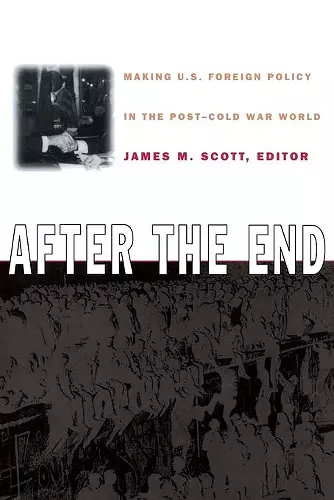After the End
Making U.S. Foreign Policy in the Post-Cold War World
Format:Paperback
Publisher:Duke University Press
Published:21st Jan '99
Currently unavailable, and unfortunately no date known when it will be back

Investigates the international and domestic political landscapes in order to understand the constraints and imperatives of U.S. post-Cold War foreign policy.
Considers setting and place as irreducible features of the human condition and sociocultural existence. Focusing on a range of periods in places from France to the Balkans and from Siberia to San Diego, this work concentrates on such subjects as the Lockean landscapes, 19th-century Australian and North American landscape paintings, and zoos.In the political landscape emerging from the end of the Cold War, making U.S. foreign policy has become more difficult, due in part to less clarity and consensus about threats and interests. In After the End James M. Scott brings together a group of scholars to explore the changing international situation since 1991 and to examine the characteristics and patterns of policy making that are emerging in response to a post–Cold War world.
These essays examine the recent efforts of U.S. policymakers to recast the roles, interests, and purposes of the United States both at home and abroad in a political environment where policy making has become increasingly decentralized and democratized. The contributors suggest that foreign policy leadership has shifted from White House and executive branch dominance to an expanded group of actors that includes the president, Congress, the foreign policy bureaucracy, interest groups, the media, and the public. The volume includes case studies that focus on China, Russia, Bosnia, Somalia, democracy promotion, foreign aid, and NAFTA. Together, these chapters describe how policy making after 1991 compares to that of other periods and suggest how foreign policy will develop in the future.
This collection provides a broad, balanced evaluation of U.S. foreign policy making in the post–Cold War setting for scholars, teachers, and students of U.S. foreign policy, political science, history, and international studies.
Contributors. Ralph G. Carter, Richard Clark, A. Lane Crothers, I. M. Destler, Ole R. Holsti, Steven W. Hook, Christopher M. Jones, James M. McCormick, Jerel Rosati, Jeremy Rosner, John T. Rourke, Renee G. Scherlen, Peter J. Schraeder, James M. Scott, Jennifer Sterling-Folker, Rick Travis, Stephen Twing
“Highly recommended for scholars, specialists, and advanced students—an informed synthesis of recent theory and research on the formulation of American foreign policy.”—Charles W. Kegley, Pearce Professor of International Relations at the University of South Carolina
ISBN: 9780822322665
Dimensions: unknown
Weight: 821g
448 pages